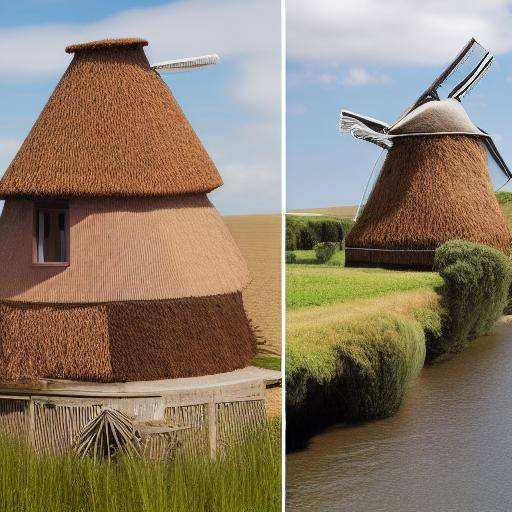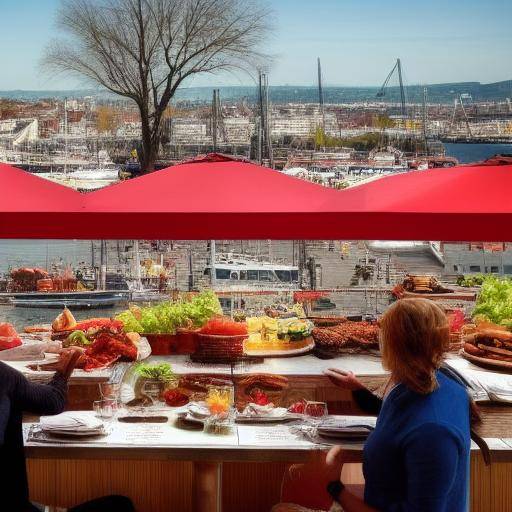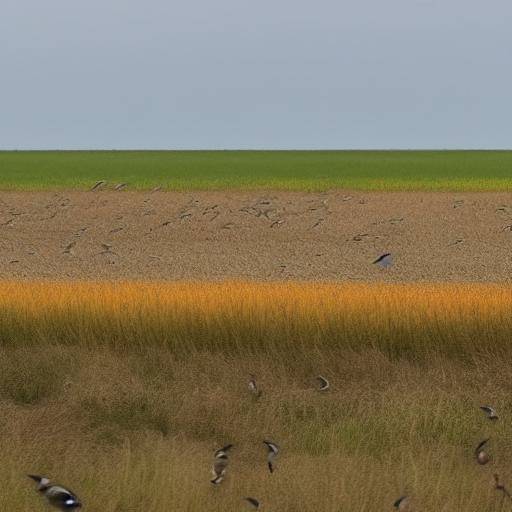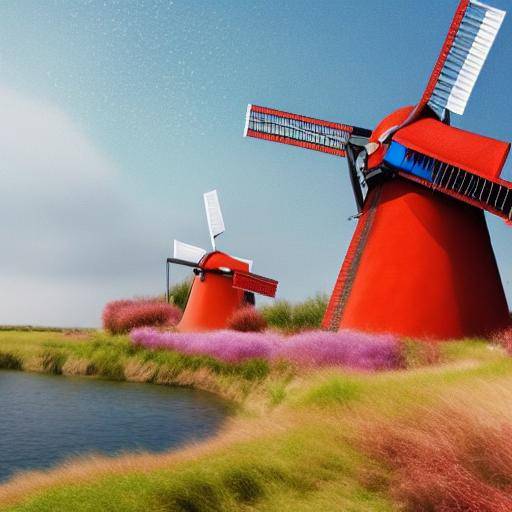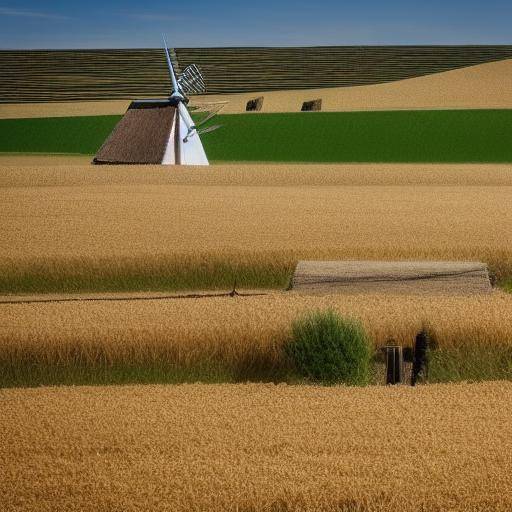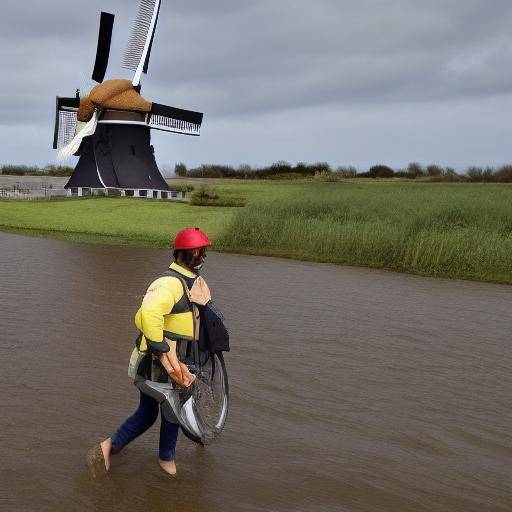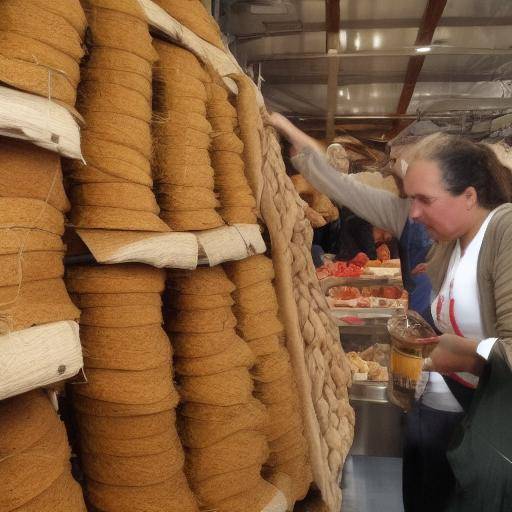
The Dutch countryside, adorned with iconic windmills, is a place where history comes to life and local flavors intertwine with tradition. From its historic windmills to its world-famous cheeses, Holland offers a gastronomic experience that captivates the senses and nourishes the soul. In this article, we will explore the rich history of the Dutch windmills and immerse ourselves in the delicious tradition of Dutch cuisine, highlighting the local products that can be found in the picturesque historic farms.
Discovering the Netherlands Wind Molinos
The landscape of Holland is defined by its majestic windmills, iconic symbols of the history and engineering of the country. Windmills have played a crucial role in Dutch history, used to drain lowlands and grind grains. These marvels of engineering, dating back centuries, embody the innovation and perseverance of the Dutch people.
History and Cultural Significance
Windmills are not only technically impressive structures, but have also played a crucial role in Holland's history and culture. Since its introduction in the 12th century, these mills have not only been fundamental to the land drainage process, but have also become a symbol of the Dutch identity. The beauty and functionality of these mills have inspired artists, writers and travelers for centuries.
Visits to the Wind Molinos
Visiting the Dutch windmills is a unique experience that allows tourists to appreciate the grandeur and history behind these constructions. From Zaanse Schans to Kinderdijk, there are many places where you can admire and visit these stunning windmills. By exploring the mills, visitors have the opportunity to immerse themselves in the history and crafts that surround these emblematic structures.
Impact on Local Gastronomy
The influence of windmills in Dutch gastronomy is undeniable. Regions that host windmills are often impregnated with a rich culinary tradition, with historic farms offering high-quality local products.
La Riqueza de la Gastronomía Holandesa: Quesos y Productos Locales
The Charm of the Dutch Cheese
The Dutch cheeses, with their unmistakable quality and flavor, occupy a prominent place in world cuisine. From the famous Gouda cheese to the delicious Edam, Dutch cheeses are appreciated for their richness and variety. The historic farms surrounding the Dutch windmills are home to these exquisite cheeses, where visitors can enjoy tastings and purchase these products directly from local producers.
The Influence of Historical Farms
The historic farms around the Dutch windmills play a crucial role in preserving traditional methods of food production. These places offer visitors the opportunity to explore food production in an authentic way, participating in activities such as cheese making, harvesting agricultural products and tasting traditional dishes.
Authentic Flavors in Historical Environments
The combination of the living history of windmills and the authenticity of historical farms creates a unique setting to explore the flavors of Dutch cuisine. Visitors have the possibility to taste fresh and local products, while immersed in an environment that pays tribute to the culinary traditions rooted in Holland's culture.
Gastronomic journey to Holland: Exploring the Intersection of History and Flavors
The charm of windmills and the wealth of Dutch gastronomy are intertwined in a unique experience that captures the essence of tradition and innovation. Entering into this gastronomic journey is to immerse yourself in the history, culture and wealth of local flavors in the historical farms of Holland. From the iconic windmills to the incomparable Dutch cheeses, every moment offers an opportunity to delight with the culinary treasures and live an unforgettable experience.
The Dutch windmills, emblems of their historical heritage, and the world-renowned Dutch cuisine merge in a journey that leads to the heart of tradition and culinary innovation. This article is an invitation to discover the magic that is displayed in the picturesque Dutch lands, where history comes alive and the local flavors become a celebration of culinary authenticity. From the majesty of windmills to the exquisite craftsmanship of cheeses, this journey promises to captivate their senses and to feed their appetite for gastronomic culture.
Discovering the Essence of the Netherlands Wind Molinos
The charm of the Dutch windmills, with its powerful presence and historical impact, is a wonder that has transcended time. These iconic structures have witnessed centuries of history, playing a fundamental role in the evolution of the Dutch landscape and identity.
History and Meaning
The presence of windmills in Holland dates back centuries, when used to drain the lowlands and grind grains. Not only were they vital tools for the economy and society, but they also became symbols of the Dutch determination to face the challenges of the natural environment.
Visits to the Wind Molinos
Visitors have the opportunity to enter the history and engineering of windmills through guided tours and interactive experiences. This allows them to understand closely the functioning and importance of these extraordinary structures. In addition, the visit to the mills offers an ideal setting to appreciate the beauty of the surrounding nature and the cultural influence that has permeated the Dutch rural life.
Influence in Gastronomy
The presence of windmills in the Dutch regions has influenced local gastronomy by providing an enabling environment for the development of high quality agricultural products. The surrounding lands often house farms that produce fresh and delicious ingredients, which in turn have contributed to forging the culinary reputation of the Netherlands.
The Dutch Culinary Tradition: Delights in the Historic Farms
Dutch cheeses: Culinary Treasures
The Dutch cheeses, with their incomparable flavor and texture, are the pride of Dutch cuisine. From the famous Gouda cheese to the famous Edam, these handmade cheeses have gained recognition worldwide for their unmatched quality. The historic farms surrounding the windmills offer visitors the opportunity to explore and savor a variety of traditional cheeses made with centuries-old techniques.
Aromas and Flavors in Historical Environments
The historic farms are not only places of production, but also spaces that invite visitors to immerse themselves in the rich culinary tradition of Holland. Here, you can enjoy cheese tastings, participate in the elaboration of artisanal dairy products and get to know the craftsmanship that drives the production of food of the highest quality. The authenticity of these culinary experiences reflects the passion and commitment of local producers, transmitting the connection between land, tradition and palate.
In short, the Dutch windmills and the exquisite local gastronomy merge into an experience that transcends the mere tasting, becoming a tribute to the history, culture and culinary authenticity. This trip invites visitors to explore the wonders of engineering and to taste the gastronomic treasures in the peaceful Dutch lands, where each bite is a celebration of historical heritage and culinary excellence.
Frequently asked questions
1. What is the historical importance of windmills in Holland?
Windmills have played a crucial role in Holland's history by draining lowlands and grinding grains, contributing significantly to the country's economic and social development.
2. Where can I visit the windmills in Holland?
Some of the most outstanding places to visit windmills in the Netherlands include Zaanse Schans, Kinderdijk and Schiedam, where you can admire and explore these emblematic structures.
3. What are some of the most famous Dutch cheeses?
Gouda cheese, Edam, Maasdam and Leyden are some of the most famous Dutch cheeses that offer a variety of flavors and textures to enjoy.
4. What gastronomic experiences do historic farms offer in the surroundings of windmills?
Historical farms offer experiences such as cheese tastings, participation in craft dairy products and the opportunity to acquire local products directly from producers.
5. What influence do windmills have in local gastronomy?
The presence of windmills has contributed to the development of high-quality agricultural products in the Dutch regions, influencing the country's culinary reputation.
6. What makes Dutch gastronomy unique in relation to other countries?
The combination of fresh local ingredients, rooted culinary traditions and the influence of history and culture gives Dutch cuisine a distinctive identity and a wealth of flavors.
In conclusion, the Dutch windmills and local gastronomy intertwine in a symphony of living history and authentic flavors, creating an experience that gives away moments of delight and discovery. This journey promises to bring visitors to a world where tradition, innovation and culinary excellence converge to offer a banquet for senses and spirit. Enjoy this trip through the history and unforgettable flavors of Holland!

